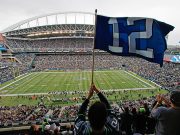by Larry Sivitz, Seattle24x7 Managing Editor
 The rising tide of Internet Search marketing that is known by synonyms such as “pay-per-click,” “sponsored search” and “paid search,” and acronyms like PPC, CPC, KPI and ROI, breaks gently along the rocky shores of Port Townsend, Washington, where it lifts large auto ferries and rocks hand carved wooden boats in its wake.
The rising tide of Internet Search marketing that is known by synonyms such as “pay-per-click,” “sponsored search” and “paid search,” and acronyms like PPC, CPC, KPI and ROI, breaks gently along the rocky shores of Port Townsend, Washington, where it lifts large auto ferries and rocks hand carved wooden boats in its wake.
This bucolic corner of the Puget Sound peninsula is something of an anachronism for high tech aficionados. Situated just an hour from downtown Seattle, “PT” is home to 19th century buildings, Victorian bed and breakfast’s, and classic Fort Worden, a historic military outpost made famous in the movie “An Officer and a Gentlemen.”
Such a crease in the fabric of time is not the place you’d expect to find the offices of a thought leader in pay-per-click search marketing. But, Mary O’Brien, has a penchant for being in the right place at just the right time. Like the day she shared an elevator ride with Bill Gross, the visionary founder of GoTo ![]() Marketing, and found herself at the very spot where pay-per-click advertising was being born and about to be transformed into a company known as Overture.
Marketing, and found herself at the very spot where pay-per-click advertising was being born and about to be transformed into a company known as Overture.
The legendary start of search marketing has become fabled by now with Google in the starring role as protagonist. But retracing the search marketing timeline back to 1992, it was Yahoo who was first to acquire Overture and own the world’s original, pay-per-click, keyword-based advertising system. This modern milestone in Web marketing history transpired before sponsored search advertisng was even a glimmer in the eye of Google’s Sergey Brin or Larry Page. And Mary O’Brien was there at the beachhead, ready to ride the wave that would surge all the way to the summit of PPC!
For Mary, the trail that lead to that summit began at that chance meeting with technology wunderkind Bill Gross who made a practice of incubating a steady roster of Internet start-ups inside of a firm called idealab. At the time, Mary was interviewing with CarsDirect for a training role and she happened to meet Bill Gross in an elevator. After explaining she was there for a job interview, Bill exuded, “I have this other great company that you should talk to. It’s called GoTo.com!”
“I had no idea who this guy was,” recalls Mary, speaking on Webmasterradio.fm in September of last year. “He was covered in technology: the Blackberry plugged into his ear, a laptop in his arms, things just hanging off him. He was very enthusiastic, a really sharp guy, and, as I would quickly discover, one of the smartest people I’d ever met. It was quite an experience to literally get offered a job in an elevator!”
Mary joined GoTo.com Inc. as Senior Director of Training & Development with the mission of introducing to legions what would become a revolutionary concept in advertising called “pay -per click.” At the time, GoTo was positioning itself to become a destination portal. The company had bought AuctionRover, and a shopping site called Cadabra. The table seemed to be set.
But along the way to portal-dom, GoTo discovered that its partners were more interested in the search results it had to offer and the monetization that search could provide. GoTo began pushing search results out to partners like AOL and Lyco, and later Microsoft among others. The trajectory was quickly altered for GoTo to launch as a search portal and a new name was sought to go along with the posiitoning, one that would describe the idea of introducing advertisers to customers. “There’s an “overture” involved there and that’s where the Overture name came from,” said O’Brien.
After AOL and Alta Vista, partnerhship deals and search distirbution quickly evolved with Yahoo and Microsoft until it got to the point where search results coming from GoTo itself represented only 8% of the total network’s traffic. Conversations sprang up. Would Overture be bought and by whom? As it turned out, Yahoo bought the company and renamed the PPC advertising system Yahoo Search Marketing.
For a long time, GoTo thought that their suitor was going to be Microsoft who had done a lot of research into how the Overture PPC technology worked. Hard to believe now, but at the time, Microsoft didn’t feel that search was search was a money-maker. And where was Google?
“I remember early conversations at GoTo in 1998, where we were looking at the competitive landscape and Google wasn’t even a feature. They had just started at that point. They didn’t have any revenue. They weren’t doing any pay-per-click advertising at all. We were talking about LookSmart, Alta Vista. Google wasn’t even on the list!”
It wasn’t until 1999 or 2000 that Google introduced their AdWords and AdWords Select products and started offering pay-per-click advertising as well.
How did Google come to surpass Yahoo’s early advantage in search marketing? According to Mary, it was simply a matter of technology and scalability. Google was able to enter the marketplace with a “self-service” solution that was technology-driven and less dependent on employing a large editorial team of people in the background (like Yahoo). Google’s weapon was automation and there were very few barriers to entry!
Today’s Google Quality Score continues the tradition of self- service that works algorithmically, without the manpower of a human editorial team behind it.
Yahoo’s fading was unfortunate lamented Mary, “I remember affiliates calling me up and telling me they were making millions just by buying clicks for pennies and selling books for Amazon and things like that. But as the Yahoo system grew, it became very cumbersome having all those advertisers pinging the system at the same time. Google was able to handle it from the very start. Plus, all Google had to focus on in the early days was Search itself whereas Yahoo had the whole portal experience. Yahoo took their eye off search for a long time! At long last, Yahoo is putting the attention back where it belongs!”
Which brings us back to today’s world of analytics-based, performance-driven PPC marketing where the science of search is helping search marketers bust-through a recessionary climate.
 Now in its third year, O’Brien’s PPC Summit will introduce a star-studded expert pool of Search Engine Marketers from Microsoft, Google and other leaders from the Search Marketing community for face-to-face discussions, expert strategies and real world best practices.
Now in its third year, O’Brien’s PPC Summit will introduce a star-studded expert pool of Search Engine Marketers from Microsoft, Google and other leaders from the Search Marketing community for face-to-face discussions, expert strategies and real world best practices.
“PPC Summit meets a crucial need for search engine marketing and brings together the right people and ingredients for learning, collaboration and productive networking that result in increased ROI,” says O’Brien.
In tough economic times, with increasing competition and tightening marketing budgets, marketers are forced to make decisions based on how to most effectively maximize their advertising dollars. As companies proceed with caution and move forward with their 2009 marketing initiatives 44% plan to increase their Search Marketing ad budget dollars in 2009 according to a recent Marketing Outlook survey
Look for more information about upcoming conferences in Chicago: April 22-23, New York: June 16-17 and Los Angeles: September 24-25 on the PPC Summit Website at www.ppcsummit.com/overview.html [24×7]
Seattle24x7 wishes to thank WebmasterRadio.fm, producers of the PPC Rock Stars Podcast starring David Szetela and engineer Jorge Brasco for their cooperation with background media.
Plan to attend upcoming conferences in Chicago: April 22-23, New York: June 16-17 and Los Angeles: September 24-25. Get more info at the PPC Summit Website.




















